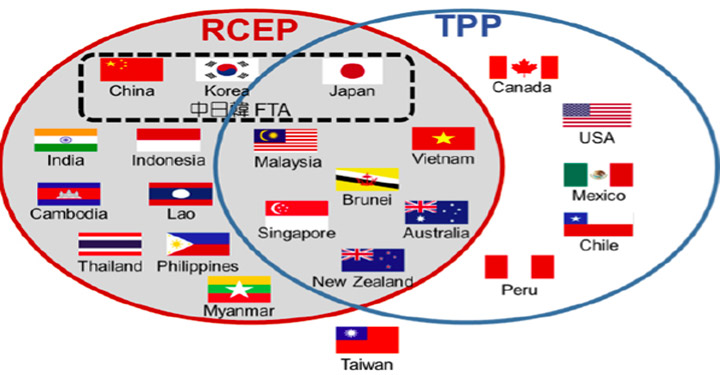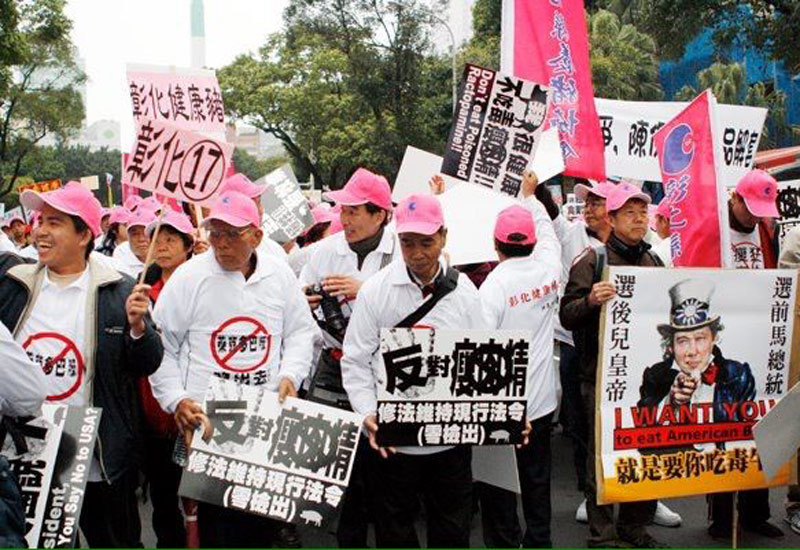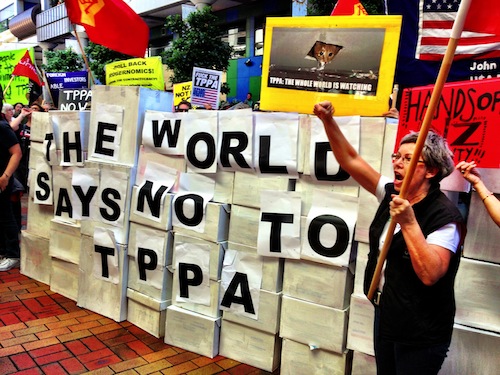by Brian Hioe
語言:
English
Photo Credit: WikiCommons
BASED ON POLICY statements during presidential elections, the strategy of Tsai Ing-Wen’s incoming administration would seem to be highly focused on signing free trade agreements in order to improve Taiwan’s international standing. This includes signing free trade agreements with China and America alike, as well as with Southeast Asian nations and Europe.
But given that Taiwan’s international status would seem to be caught between the two superpowers of China and America, it is the prospect of signing free trade agreements with both countries which has seen the most discussion. Probably it is that Tsai Ing-Wen’s overall economic policy can be deemed neoliberal, however, what is a topic of discussion is whether it would be advisable for Taiwan to sign not only the RCEP with China but also the TPP with America.

The overlap between RCEP and TPP countries. Photo credit: ATUC
Tsai downplayed her intent to sign the RCEP with China during past elections in order to get elected. It remains to be seen whether pushing for the RCEP will lead to blowback against Tsai down the line, given that Tsai also intends to keep pushing for the CSSTA which was the cause of the Sunflower Movement student occupation in 2014.
If opposition against the RCEP is to be expected, given that it is a free trade agreement with China and would likely serve as a means for China to diminish Taiwanese sovereignty through economic means, the question of whether to sign the TPP or not is a bigger question for some. Ultimately, we find that if the CSSTA provoked such blowback in 2014 as a “Black Box” pushed through legislature without discussion, the TPP may be no less of a black box, and would also be diminishing of Taiwanese democratic freedoms by selling them out to corporate interest.
Is The TPP A Black Box?
WHAT IS NOTEWORTHY from the get-go about the TPP is that trade negotiations conducted in a way that elected representatives of the government were not allowed access to the full text of the trade agreement. It was argued that if elected representatives had access to the text they could potentially undercut negotiations
While in theory, with the completion of trade negotiations for the TPP, different national legislatures have the ability to vote on the trade agreement and to possibly reject it, this is on the basis of either taking the trade agreement as is or rejecting it. As such, the influence of democratically elected representatives of member nations of the TPP is negligible upon negotiating the meaning of the text. The TPP was largely negotiated by unelected government technocrats from the foreign policy and economic policy establishments of the different national governments or, at best, small committees of elected representatives. On this basis, the TPP is already undemocratic in nature.
The secrecy of the TPP negotiation process was such that in America, the main country behind the impetus for the TPP, American senators were only allowed to read the text of the TPP in one of two secure, soundproofed reading rooms in the basement of the American Capitol after surrendering electronic devices to security. No notes were allowed be taken within the secure reading room, and senators were not allowed to speak to anyone about the written text—even in cases when senators may need to consult with industry experts or legal experts in order to understand technical aspects. One can only imagine what security measures are for elected representatives of other TPP member nations.
In many cases, the dense nature of the legal text and the copious amount of notes about varying versions of the text already make understanding it difficult. But such security measures, the dense nature of the text itself, and the inconvenience of that the text was only available for viewing in Washington DC were arguably a way to limit access to the text, in order to prevent possible opposition—never mind that democratically elected representatives have a responsibility to answer for their constituencies regarding the potentials benefits or detriments of such a deal. And the take-it-or-leave it nature of the negotiating process already favors TPP ratification, precluding oversight or review of the agreement. Shades of the CSSTA, anyone?
Yet if democratically elected representatives were largely excluded from the TPP process, the paradox is that corporate interests were allowed to sit at the negotiating table and have a direct influence on what the text states. This was accomplished through the appointment of multinational corporate representatives to “Industry Trade Advisory Committees,” including corporations as AT&T, Apple, the American Petroleum Institute, General Electric, Dow Chemical, Nike, and Walmart.
Corporations are deemed to be “experts”, who should be consulted in regards to the influence of such a trade agreements upon the global economy. Again, the logic of neoliberalism would seem to be technocracy, and this is the logic which underwrites all free trade agreements. But this becomes a means of overriding democratic establishment in the name of supposed expertise, allowing for the dominance of a select few—in this case, for the dominance of corporate interest. Such advisory committees are allowed greater access to the text than most elected representatives and their influence upon the drafting of the TPP is allowed go without being publicly revealed, which is also justified as that it is sensitive information which could influence the course of negotiating the TPP.
Indeed, during the majority of the negotiating process, the public at large was denied access to the text of the TPP. Much of the information which could be gathered about the text originally came from WikiLeaks, with only elected officials and corporate representatives allowed access to the text. As discussed, restrictions were placed on the ability of even elected officials to access the text. Despite being a trade deal which would affect some forty percent of the world economy, the public was only allowed access to the text last year.
What Would the Effects of the TPP on Taiwan Be?
IF THE TPP is undoubtedly a “Black Box” trade agreement, what would the effects of the TPP upon Taiwan? To begin with the TPP in fact contains a measure allowing for corporations to sue standing national governments for breaches of international trade treaties signed by that government, allowing corporations to override public interest laws of member nations of the TPP if they can make a sufficient case that government laws are impeding their ability to make profit.
We have enough problems with corporations allowed to demolish homes in Taiwan when they can justify the need to do so for the sake of commercial development. Imagine such problems on a national scale, in which aspects of national infrastructure are made beholden to corporations who become able to sue the government.
Likely, what would be first to go is the current system of universal health insurance in Taiwan. With the strengthening of intellectual property laws to apply them to the pharmaceutical industry in any country that signs the TPP, cheaper drugs would be kept out of the market as a result. Given the overinflation of drug prices relative to their production costs, this would ultimately lead to cheap drugs being kept out of the hands of those who need it to the benefit of large pharmaceutical corporations—which may have a very direct effect on the lives of those in need of life-saving drugs whose prices may now become unaffordable.
Would Taiwan’s universal health insurance system be able to survive increasing costs? The current universal health system would go bankrupt and have to privatized. In looking at the past history of the effects neoliberal policies, this would have historical precedent, as we see with the privatization of public services after maintaining them becomes too expensive. Presently in the US, an example would be the likely future breakdown of the social security system once social security trust funds run out in the 2030s. We would also see restrictions placed upon the current freedoms of the Taiwanese health system in which patients can visit any doctors or hospital they chose. For example, in the US, individuals are only allowed to visit doctors or hospitals within their insurance network.
The TPP would also have severe costs on environmental protections in Taiwan. Under the TPP, oil companies would, for example, be allowed to sue governments for reducing profits through environmental protections. If efforts are made in Taiwan to switch to cleaner and safer forms of energy, signing onto the TPP would make this efforts futile. With oil and petroleum companies allowed to sit at the table for TPP trade negotiations, unsurprisingly, the TPP favors such forms of energy.
This may involve restructuring of the Taiwanese electric industry, in particular, where Taipower, as a state-run power company, is concerned. If a total dismantling of Taipower seems unlikely, a possible scenario may mean moving towards semi-privatization along the lines of Japan’s post-war energy companies—ostensibly private, but with continued strong connections to the state. But this would allow for international companies to sue the Taiwanese government, theoretically allowing for the entrance of energy, oil, or petroleum corporations from the international world to enter Taiwan with the breaking down of trade barriers.
Food safety measures would also be negatively impacted by the TPP. If a country is deemed to have food safety equivalent to that of Taiwan, food from that would have to be allowed to be imported into Taiwan, regardless of whether or not it meets food safety standards. In closer examination of the pork import issue, given that American pork imports would have to be allowed into Taiwan if Taiwan hopes to join the TPP, we find that this is a case in which the American government extorts Taiwan on the grounds of security assurances against China in order to benefit its domestic industries.
 Demonstrations against American pig imports in 2012. Photo credit: UDN
Demonstrations against American pig imports in 2012. Photo credit: UDN
But with the TPP, letting American pork imports into Taiwan would be only the least of TPP entrance conditions which would endanger the welfare of Taiwanese by selling them out to corporations and one actually expects more food scandals to occur after TPP ratification. With the rise of local farming in Taiwan in recent years as a way to deal with food safety issues, local farming would be negatively impacted after TPP ratification due to competition with imported products from large corporations from abroad. In general, domestic industries would be undercut by competition from multinational corporations, regardless of sector.
More broadly, the entrance of Asia-Pacific countries into free trade bodies and the lifting of trade barriers which are conditional to entrance into such has led to the collapse of domestic industries now swamped by international capital. Taiwan would be no exception, as we can see the past precedent of IMF loans to East Asian countries after the 1997 Asian financial crisis, and the effect upon Taiwan after its entrance into the WTO.
It is has also likely never entered the minds of uncritical TPP supporters to remember past incidents in which foreign corporations shifted manufacturing to Taiwan because of cheap production costs and laxer standards in Taiwan, to the detriment or even permanent injury of Taiwanese workers as we see in the RCA Taiwan incident of the late 1960s—a case which dragged on over 40 years. Would Taiwan become a site for cheap manufacturing, in fact, it were more closely interwoven into the economic bloc which the TPP would seek to form? If so, what would the price be for Taiwanese workers? Such considerations go ignored in discussions of the TPP to date.
Conclusion: Is There A Way Out of Neoliberal Trade Policies?
THE PUSH FOR the TPP from Tsai Ing-Wen may come from the need to cement both trade and political ties with America. Apart from the need to cement geopolitical alliance with America against China, the TPP is seen as an attempt by America to forestall China through the formation of an economic bloc under its auspices. The other justifying logic for signing the TPP would be that if Taiwan does not sign the TPP, it is only pursing small minded protectionism and will be left behind by the rest of the world—an all too typical justification for neoliberalism. Again, the specter of China is also present in this, as it is argued that Taiwan needs to grab onto whatever trade opportunities possible when it is already overshadowed by China.
In reality, the TPP and many such free trade deals are ways for larger countries to play off of the insecurities of smaller countries for their benefit, with the suggestion that geopolitical security will come with signing free trade agreements. Namely, the TPP is hardly a guarantor of American protection for Taiwan, given that America’s eyes will always be set upon relations with China above those with Taiwan. There is no getting around that China is many times larger than Taiwan and the other world superpower apart from the US. It is a question to begin with whether America would allow Taiwan into the TPP for fear of provoking China. And the benefits of the TPP would largely benefit multinational corporations at the expense of small countries which sign the agreement in order to secure international standing.
 Photo credit: Electronic Frontier Foundation
Photo credit: Electronic Frontier Foundation
Yet there will likely be greater opposition to the RCEP than opposition to the TPP in Taiwan, given Taiwan’s relative relation to China and America. Likewise, in Taiwan, there has been insufficient discussion of neoliberalism and the meaning of free trade. Tsai Ing-Wen intends to pursue neoliberal policies in international trade. This is not altogether surprising in consideration of global political trends in Taiwan, East Asia, and elsewhere. Yet neoliberal policies privileging the free market above government regulation places corporate interest above the those of the people and provides for the dominance of a corporate elite. If Taiwan intends to sign free trade agreements to secure its status in the world—apart from that this will not be successful—the people’s interest will be the cost.
Where are alternatives, then? Arguably, Taiwan could pursue developing trade ties with other smaller countries, who are also on the receiving end of neoliberal policy from larger countries, in order to jointly pursue a means out of the neoliberal trap of international free trade agreements. What Taiwan could pursue is a policy of South-South cooperation with other countries of the global South. However, this line of thinking is what remains to be developed further. In most cases, Taiwan still looks to strong countries to provide insurance and protection, rather than seek to ally with other countries similarly caught between world superpowers.



 Photo credit: Electronic Frontier Foundation
Photo credit: Electronic Frontier Foundation